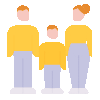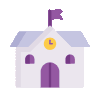In most situations it is important to diagnose problems sooner than later. How can we diagnose issues when our children aren’t even communicating yet? They can’t say, “Mommy I don’t feel like talking,” or “Daddy I don’t want to play with the other kids.” So how is it that infants and children can be diagnosed with autism before even speaking to voice their concerns and explain their symptoms?
What is Autism?
Autism is a complex disorder that can affect children in different ways. Two children with the exact same diagnosis may have very dissimilar symptoms. It is important to know what areas may be affected in your child’s development.
Our social skills, language and behavior are constantly receiving input from the world around us. As we grow, we are learning ways to communicate, listen, and receive information. Monitor the way your child receives this information, in addition to the way they try to respond to it and express reactions to it.
Social Observations
- Does your child respond to you when you say his or her name?
- Does your child react adversely to holding, or cuddling?
- Does your child avoid eye contact?
- Does your child prefer to play by him or herself rather than interact with others?
Behavioral Observations
- Does your child engage in repetitive motion, like rocking or constant flapping?
- Does your child perform rituals or routines?
- Is he or she upset when these routines are not followed?
- Is he or she overly sensitive to touch, light and sound?
- Is he or she oblivious to pain?
Language Observations
- Does he or she make eye contact when speaking?
- Has your child lost the ability to use previously learned words?
- Does your child speak with an abnormal tone or rhythm (“robot” voice)?
Milestones to Indicate Normal Development
If your child hasn’t performed the following, he or she should be taken for an evaluation by a physician. It is best to approach your concern early, rather than wait until later. The sooner autism is diagnosed, the greater the success of therapy.
- 6 months: Your child hasn’t smiled or expressed happiness or excitement.
- 9 months: Your child hasn’t mirrored any of your sounds or expressions.
- 12 months: Your child hasn’t babbled or cooed.
- 12 months: Your child hasn’t mirrored or exchanged gestures i.e. waving, reaching.
- 16 months: Your child hasn’t spoken any words.
- 24 months: Your child hasn’t used any two-word phrases.
In their infancy children make incredible growth and progression; if you witness any loss or backtracking, this can be a tell-tale sign of autism.












